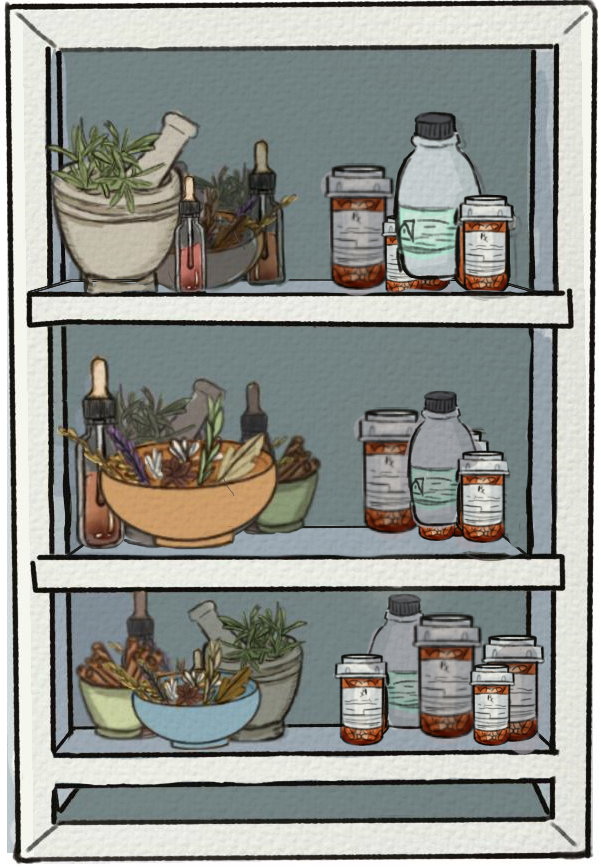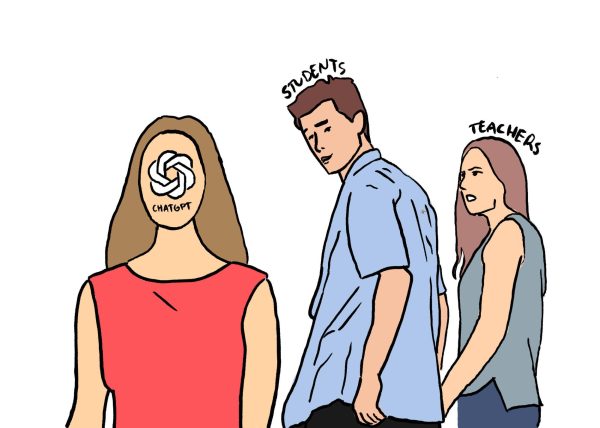Alternative answers
photo by Marcela Carrasco
Choosing between alternative medication and traditional medication can be a struggle, especially when one’s symptoms call for both. Many students use a mix of both, depending on which is most convenient.
With continued innovation, modern medicine resembles a Holy Grail— a network of drugs that provide healing and rejuvenation with few downsides. However, this is not everyone’s reality. Long lists of side effects and concerningly vague ingredients encourage students to avoid traditional medicine and search for alternatives instead.
For junior Abigail Miller, home remedies offer a safer, more trustworthy alternative to modern medicine.
“We’ve been trying to cure sickness without all the side effects of normal medicine,” she said.
Miller and her family rely more on home remedies than traditional medication, including essential oils, herbs, and common culinary ingredients for their medical benefits. She uses a blend of citronella, lavender, and rosemary essential oils to soothe itchy bug bites while utilizing baking soda for sore throats.
“I can trust home remedies because we know there aren’t any undisclosed side effects, and they’re pretty straightforward,” Miller said.
Miller finds these remedies more trustworthy than obscure, traditional medication.
“The lack of transparency is bad because everyone might not know about the ingredients of a drug,” Miller said, “and there’s no way to know exactly how it will affect them and their body.”
While Miller trusts the simplicity of home remedies, junior Samantha Fusca finds solace in their convenience.
“Instead of having to receive a prescription, pick up the medication, and pay for the entire process, I can just look in my fridge and make ‘medicine’ for free by using what I already have,” Fusca said.
Although Fusca previously held little trust in natural remedies, she now swears by several that were recommended to her by formal doctors and nurses.
“One of the remedies I use was actually doctor-recommended,” Fusca said. “It’s literally just iced lemon water, and it helps with relieving congestion from a cold or the flu.”
Alternative medicine has much to offer in terms of naturality and convenience, sophomore Brandon Nieten would rather have both home remedies and traditional medicine to fall back on.
“I think people should use [home remedies], but they should also consult a doctor about the disease or bug,” Nieten said.
While traditional medication is developed in a lab and undergoes meticulous scrutiny before it is ever sold to the public, home remedies are more often born from old family traditions, old wives’ tales, or unmonitored health blogs that might not be entirely accurate. For example, a common misconception is that Echinacea, a flower rumored to shorten the length of a cold, actually does nothing to relieve symptoms. In reality, it hardly has any effect. Neither does “sweating out a cold” which, according to Healthline, only serves to dehydrate the body and prolong symptoms. However, sophomore Brandon Nieten’s most trusted remedy for cold does not require extensive research. Instead, it has years of tradition to attest to its effectiveness.
“[Home remedies] bring me closer to my family and it makes me feel unique,” Nieten said.
Nieten’s family uses cooked rice to mend fevers and colds. This simple remedy was passed down from his Taiwanese grandmother, and him and his family now use it frequently.
“It generally feels like we know this secret that a lot of people just don’t know,” Nieten said.
Unlike Nieten, Miller finds her remedies online, and because they are not as familiar as time-tested, family tradition, research becomes a top priority.
“I think that research becomes way more important when you’re depending on medicine that isn’t regulated as much as traditional medication,” Miller said. “With simple remedies like honey or tea, it isn’t necessary, but if you’re using a strange plant or something you don’t know that much about, extensive research could save you a lot of trouble.”
Whether home remedies are objectively reliable or not, they still serve to comfort those who use them.
Your donation will support the student journalists of Hagerty High School. Your contribution helps us publish six issues of the BluePrint and cover our annual website hosting costs. Thank you so much!









